常见句型的翻译
英语翻译常用句型(加精)

英语翻译常考句型详解1.It is not that…but that… 这不是说…,而是说…「例文」It is not that the scales in the one case, and the balance in the other, differ in the principles of their construction or manner of working; but that the latter is much finer apparatus and of couse much more accurate in its measurement than the former.「译文」这并不是说在一种情况下所使用的磅秤和在另一种情况下所使用的天平在构造原理上或工作方式上存在差别,而是说与前者相比,后者是一种更精密得多的装置,因而在计量上必然更加准确。
2.nothing else than 完全是,实在是「例文」What the man said was nothing else than nonsense.「译文」那个人讲的话完全是一派胡言。
3.as引导的特殊状语从句,翻译时做定语从句处理。
「例文」We hope the measures to control prices, as they have been taken by the government, will succeed.「译文」我们希望,政府已经采取的控制物价的措施将取得成功。
4.名词+or+名词结构中,or后的名词是同位语,应译为即…;或者称….「例文」Moreover, technology includes techniques , or ways to do things , as well as the manchines that may or may not be necessary to apply them.「译文」再者,除机器外技术还包括技艺,即制作方法,而运用这些记忆并不一定都需要机器。
高中英语高级句型例句及翻译
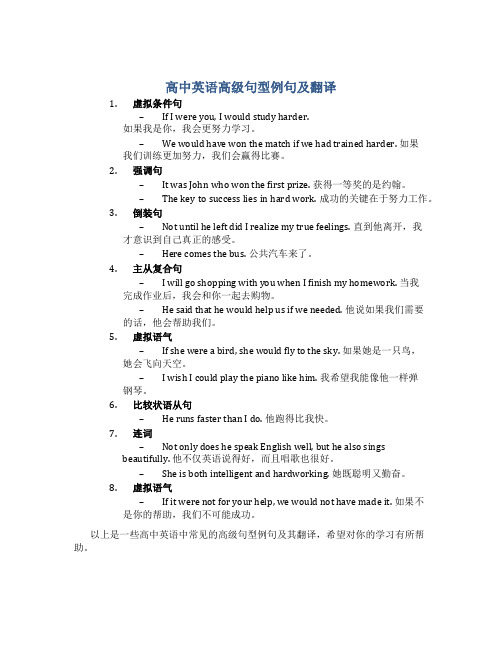
高中英语高级句型例句及翻译1.虚拟条件句–If I were you, I would study harder.如果我是你,我会更努力学习。
–We would have won the match if we had trained harder. 如果我们训练更加努力,我们会赢得比赛。
2.强调句–It was John who won the first prize. 获得一等奖的是约翰。
–The key to success lies in hard work. 成功的关键在于努力工作。
3.倒装句–Not until he left did I realize my true feelings. 直到他离开,我才意识到自己真正的感受。
–Here comes the bus. 公共汽车来了。
4.主从复合句–I will go shopping with you when I finish my homework. 当我完成作业后,我会和你一起去购物。
–He said that he would help us if we needed. 他说如果我们需要的话,他会帮助我们。
5.虚拟语气–If she were a bird, she would fly to the sky. 如果她是一只鸟,她会飞向天空。
–I wish I could play the piano like him. 我希望我能像他一样弹钢琴。
6.比较状语从句–He runs faster than I do. 他跑得比我快。
7.连词–Not only does he speak English well, but he also singsbeautifully. 他不仅英语说得好,而且唱歌也很好。
–She is both intelligent and hardworking. 她既聪明又勤奋。
8.虚拟语气–If it were not for your help, we would not have made it. 如果不是你的帮助,我们不可能成功。
英语常用句型翻译
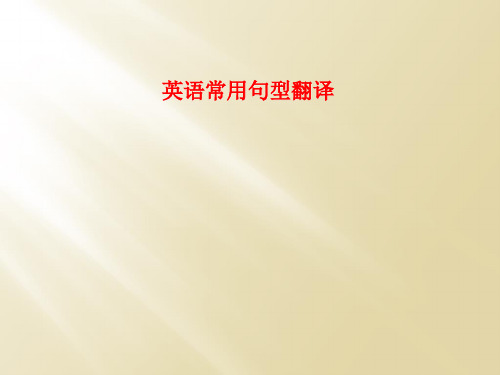
The English language has its peculiarities in negation. Of course, English-speaking people have their own way of thinking in the negation and of expressing negative implications, quite different from ours. What is affirmative in form in English may often mean something negative in Chinese, and vice versa. Whether sentences in English are to be turned to negative or affirmative requires careful consideration.
英语常用句型翻译
常用句式的翻译方法 1、强调句 2、否定句 3、虚拟语气 4、成语习语 5、其它动词形式
1、强调句的译法
英语的句子可利用不同的语法手法 来强调其中的某个成分, 从而构成 了强调句。强调的方法有三种。
(1)用do来强调的语句
可把 do 译为 “确实”、“一定” 、“必须” 等词, 以加强语气。
a. not every(=some “不是每个” )
1. Every electric motor here is not new.
这儿的电动机并不是每台都是新的。 2. Every student can not do the
experiment well. 并非每个学生都能做好实验。
(1)、全部否定(Full Negation)
常见翻译句型

常见翻译句型记完常考的重点翻译词汇,也要突击一下常考的翻译句型,连词成句,又稳拿好几分~常考句型1:形式主语it句(it is...(for sb) to do/that...)例:我们城市的多数人将享受免费医疗,这是一定的。
【参考译文】It is certain that free medical care will be given to most people in our city.常考句型2: 存在句(there be句型)此处的be可以根据汉语意思变化为各种形式如appear to be, seem to be, happen to be, used to be, ought to be, must be。
存在句除了典型的there be结构,还可以用其他的系动词如live,stand,lie,come,exist,remain 等来替换系动词be。
例:那里曾经有来自其他国家的移民。
【参考译文】There used to be immigrants from other countries.常考句型3:主谓宾结构句例:中国将加速节能产业的发展,使其到2015年成为国民经济的支柱产业。
【参考译文】China will speed up the development of energy-saving industry and make it a pillar of the national economy by 2015.常考句型4:比较句如果汉语句中出现“(不)和/像......一样”,那么可以用同级比较句“主语+谓语+(not)so/as +形容词/副词原级+as+被比较的对象”例:北京大学是中国成立最早、最著名的大学之一。
【参考译文】Peking University is one of the earliest and most famous universities in China.其他常考句型常考句型5:让步状语从句(Although... ; though...)常考句型6:原因状语从句(...because....)常考句型7:目的/结果状语从句(so (such)...that...;so that...)常考句型8:条件状语从句(If...)常考句型9:递进句(What’s more...;Moreover,...)常考句型10:结果句(Therefore, ....;..., consequently, ...)。
五种基本句型 句子翻译
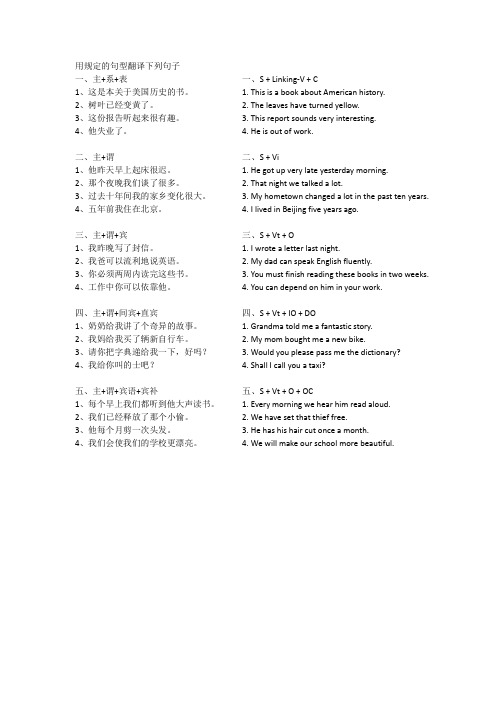
用规定的句型翻译下列句子一、主+系+表1、这是本关于美国历史的书。
2、树叶已经变黄了。
3、这份报告听起来很有趣。
4、他失业了。
二、主+谓1、他昨天早上起床很迟。
2、那个夜晚我们谈了很多。
3、过去十年间我的家乡变化很大。
4、五年前我住在北京。
三、主+谓+宾1、我昨晚写了封信。
2、我爸可以流利地说英语。
3、你必须两周内读完这些书。
4、工作中你可以依靠他。
四、主+谓+间宾+直宾1、奶奶给我讲了个奇异的故事。
2、我妈给我买了辆新自行车。
3、请你把字典递给我一下,好吗?4、我给你叫的士吧?五、主+谓+宾语+宾补1、每个早上我们都听到他大声读书。
2、我们已经释放了那个小偷。
3、他每个月剪一次头发。
4、我们会使我们的学校更漂亮。
一、S + Linking-V + C1. This is a book about American history.2. The leaves have turned yellow.3. This report sounds very interesting.4. He is out of work.二、S + Vi1. He got up very late yesterday morning.2. That night we talked a lot.3. My hometown changed a lot in the past ten years.4. I lived in Beijing five years ago.三、S + Vt + O1. I wrote a letter last night.2. My dad can speak English fluently.3. You must finish reading these books in two weeks.4. You can depend on him in your work.四、S + Vt + IO + DO1. Grandma told me a fantastic story.2. My mom bought me a new bike.3. Would you please pass me the dictionary?4. Shall I call you a taxi?五、S + Vt + O + OC1. Every morning we hear him read aloud.2. We have set that thief free.3. He has his hair cut once a month.4. We will make our school more beautiful.。
小学英语句型大全汇总翻译

小学英语句型大全汇总翻译一、问候和自我介绍1. Hello! 你好!2. Hi! 嗨!3. Good morning/afternoon/evening! 早上/下午/晚上好!4. How are you? 你好吗?5. I'm fine, thank you. 我很好,谢谢。
6. What's your name? 你叫什么名字?7. My name is (name). 我叫(名字)。
8. Nice to meet you! 很高兴认识你!二、询问与回答1. What is this? 这是什么?2. This is a (object). 这是一个(物品)。
3. What color is it? 它是什么颜色的?4. It is (color). 它是(颜色)的。
5. Is this a (object)? 这是一个(物品)吗?6. Yes, it is. 是的,是这样的。
7. No, it isn't. 不,不是这样的。
8. Are you (age) years old? 你(年龄)岁了吗?9. Yes, I am. 是的,我是(年龄)岁了。
10. No, I'm not. 不,我不是。
三、简单对话1. Can you help me? 你能帮助我吗?2. Yes, what do you need? 是的,你需要什么?3. I need (object). 我需要(物品)。
4. Here you are. 给你。
5. Thank you! 谢谢!6. You're welcome! 不客气!7. Where are you from? 你来自哪里?8. I am from (country). 我来自(国家)。
9. What is your favorite food? 你最喜欢的食物是什么?10. My favorite food is (food). 我最喜欢的食物是(食物)。
英语高考常用句型翻译
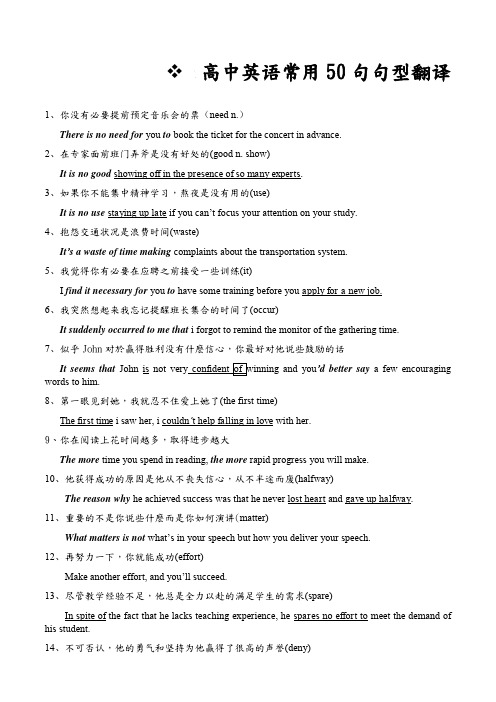
高中英语常用50句句型翻译1、你没有必要提前预定音乐会的票(need n.)There is no need for you to book the ticket for the concert in advance.2、在专家面前班门弄斧是没有好处的(good n. show)It is no good showing off in the presence of so many experts.3、如果你不能集中精神学习,熬夜是没有用的(use)It is no use staying up late if you can’t focus your attention on your study.4、抱怨交通状况是浪费时间(waste)It’s a waste of time making complaints about the transportation system.5、我觉得你有必要在应聘之前接受一些训练(it)I find it necessary for you to have some training before you apply for a new job.6、我突然想起来我忘记提醒班长集合的时间了(occur)It suddenly occurred to me that i forgot to remind the monitor of the gathering time.7、似乎John对於赢得胜利没有什麽信心,你最好对他说些鼓励的话It seems that John is not very confident of winning and you’d better say a few encouraging words to him.8、第一眼见到她,我就忍不住爱上她了(the first time)The first time i saw her, i couldn’t help falling in love with her.9、你在阅读上花时间越多,取得进步越大The more time you spend in reading, the more rapid progress you will make.10、他获得成功的原因是他从不丧失信心,从不半途而废(halfway)The reason why he achieved success was that he never lost heart and gave up halfway.11、重要的不是你说些什麽而是你如何演讲(matter)What matters is not what’s in your speech but how you deliver your speech.12、再努力一下,你就能成功(effort)Make another effort, and you’ll succeed.13、尽管教学经验不足,他总是全力以赴的满足学生的需求(spare)In spite of the fact that he lacks teaching experience, he spares no effort to meet the demand of his student.14、不可否认,他的勇气和坚持为他赢得了很高的声誉(deny)There is no denying that his courage and perseverance won him great reputation.15、毋庸置疑,这场事故应该怪司机(doubt)There is no doubt that the driver is to blame for the accident.16、吹嘘你能跑多快没意思(point)There is no point boasting about how fast you can run.17、过不了多久这位老人就能从疾病中痊愈(before)It wo n’t be long before the old man recovers from his illness.18、如果你能联系上那家电脑公司我将不胜感激(appreciate)I’d appreciate it very much if you could make contact with the computer company.19、据说缺席此次会议的人数达到了100人(add)It’s said that the number of people who are absent from the meeting adds up to 100.20、有志者,事竟成(where)Where there is a will, there is a way.21、俗话说,值得一做的事就值得做好(worth)As an old saying goes, what is worth doing is worth doing well.22、有消息传出,这位着名的女演员(word)Word came that the famous actress was accused of murder.23、似乎没有必要再等,很有可能他们不会出现了(need n. chances)There seems no need to wait any more and chances are that they won’t turn up.24、这个计划是否能顺利实行还有待观察(remain)It remains to be seen whether the plan can be carried out smoothly.25、令我们最吃惊的是它能在这麽短的时间内适应新的环境(adapt)What surprised me most was that he could adapt himself to the new surroundings during such a short time.26、是你经过自信观察得出结论的时候了(high time)It’s (about/high) time for you to draw/form/make/arrive at a conclusion after careful observation.27、她刚下火车我就发现她把笔记本电脑落在座位上了(Hardly)Hardly had she got off the train when i found that she left her laptop on the chair.28、难怪他不饿,他整天吃糖(wonder)It’s no wonder that he is not hungry, he has been eating sweets all day.29、直到他被授予了诺贝尔奖和平奖,人们才知道他的名字(Not)Not until he was rewarded the Nobel Peace Prize did people know his name.30、正是因为这场死亡十人的可怕的交通事故,这条路被封了数小时(It)It was because of the terrible accident involving 10 people that the road was closed for hours. 31、只有停电的时候我们才会意识到电的重要(Only)Only when there is a power cut can we realize how important electricity is.32、谈到物理,我一片茫然(come to)When it comes to physics, I’m completely at sea.33、人们认为政府理所当然应该采取行动阻断疾病的传播(It)It is taken for granted that the government should take action to prevent the disease from spreading.34、众所周知,很多因素促成了他在科学研究上的成就(contribute)As is known to all that many factors contributed to his great achievement in scientific research.It is known to all that many factors contributed to his great achievement in scientific research.35、实现登月之梦花了人类很多年(It)It takes man many years to realize the dream of landing on the moon.36、有可能老师会采纳学生会提出的建议(likely)It’s likely that the teacher will take/adopt the advice put forward by the Students’ Union.The teacher is likely to take/adopt the advice put forward by the Students’ Union.37、他出国已经五年了(since)It is 5 years since he went abroad.38、教授如此专注于实验,没有察觉到变化多端的天气(absorb)The professor was so absorbed in the experiment that he was not aware of the changing weather.39、一定要把安全守则牢记心中(sure)Be sure to keep the safety rules in mind.40、他退休後肯定会把公司转交给他的儿子(certain)It is certain that he’ll hand over his company to his son after retirement.41、有种日益发展的趋势,人们在网上购物而不是去商场(instead)There is a growing trend that people shop online instead of going to the department stores. 42、阅读对於头脑就像事物对於身体(what)Reading is to the mind what food is to the body.43、你同不同意这个计划不重要(make difference)It makes no difference whether you agree to the plan or not.44、我们是否要推迟运动会取决於天气(It)It all depends on the weather whether we’ll put off the sports meeting.45、这位老人把每天进行的一小时体育锻炼作为一项规定(it)The old man makes it a rule to do an hour’s physical exercise every day.46、请确定你在预定的日期前完成这项工作(sure)Make sure that you finish the task before the scheduled date.47、你和新同事相处不可能费力(difficulty)It is impossible for you to have any difficulty in getting along with your new colleagues.48、他非常高尚把一生都奉献给帮助聋儿(It)It is noble of her to devote her life to helping the deaf children.49、你最好留出足够的钱来支付额外的开销(set aside)You’d better set aside enough money to pay for the extra expense.It’s better for you to set aside enough money to pay for the extra expense.。
英语六级翻译常见句型

英语六级翻译常见句型1. “对...有一个清晰的了解” = have a clear understanding of...Example: 在新的项目上,我们需要对所有的细节都有一个清晰的了解。
In the new project, we need to have a clear understanding of all the details.2. “在某种程度上” = to some extentExample: 在某种程度上,我同意你的观点。
To some extent, I agree with your point of view.3. “没有什么比...更重要了” = Nothing is more important than...Example: 对于一家公司来说,没有什么比员工的满意度更重要了。
For a company, nothing is more important than employee satisfaction.4. “(与...)相比” = compared with/to...Example: 相比其他竞争对手,我们的产品更具优势。
Compared with/to other competitors, our product has more advantages.5. “随着时间的推移” = over timeExample: 随着时间的推移,我对这个城市的好感越来越深。
Over time, I have developed a stronger fondness for this city.6. “不管怎样” = regardless of...Example: 不管怎样,我们必须努力达到我们的目标。
Regardless of the circumstances, we must strive to achieve our goals.7. “一方面...另一方面...” = On the one hand...On the other hand...Example: 一方面,这个决策会带来更多的机会;另一方面,它也存在一些风险。
汉语的基本句型及其翻译

汉英的基本句型及其翻译Sylvia Wang574521661@一、主谓单句1)鲁迅,绍兴人。
(主语+名词谓语)•Lu Xun was from Shaoxing. [SVP]2)这个姑娘很漂亮。
(主语+形容词谓语)•That girl is very pretty. [SVP]3) 这花儿是白的。
(主语+判断谓语)•The flower is white.[SVP]4) 水库是1958年修建的。
[主语+判断谓语]•The reservoir was built in 1958. [SV(passive)] 5) 他打破了杯子。
(主语+谓语+宾语)•He broke the glass.[SVO]6) 李先生教我们地理。
(主语+谓语+宾语+宾语)•Mr. Li teaches us geography.[SVOO]防止主语的机械对应•宁波多雨。
•Ningbo sees much rain.•It rains a lot in Ningbo.•People have much rain in Ningbo.•There is much rain in Ningbo.•中国近几年来发生了巨变.•China crackles with danamics of changes these years.•China has seen (withnessed) great changes these yeats.•These years have seen (witnessed) great changes in China.•There have been great changes in China these years.•Great changes have taken place in China these years.•花园里有许多孩子。
•There are many children in the garden.•门边卧着一只狗。
翻译常用句型

翻译常用句型1. How are you doing? 你好吗?2. Can you help me? 你能帮我吗?3. What's your name? 你叫什么名字?4. Where are you from? 你从哪里来?5. How old are you? 你多大了?6. Can I have a glass of water, please? 我可以来杯水吗?7. What time is it? 几点了?8. I love you. 我爱你。
9. Thank you. 谢谢你。
10. How much does it cost? 这个多少钱?11. Where is the restroom? 厕所在哪里?12. I'm sorry. 对不起。
13. Can you speak English? 你会说英语吗?14. Where can I find a taxi? 我在哪里可以找到出租车?15. What's the weather like today? 今天天气怎么样?16. I'm hungry. 我肚子饿了。
17. What's your favorite color? 你最喜欢的颜色是什么?18. How do you say this in English? 这个用英语怎么说?19. Where do you live? 你住在哪里?20. I don't understand. 我不明白。
21. Can you repeat that, please? 你能重复一遍吗?22. I'm tired. 我累了。
23. What's your occupation? 你的职业是什么?24. What's your favorite food? 你最喜欢的食物是什么?25. How was your day? 你今天过得怎么样?26. Can you recommend a good restaurant? 你能推荐一家好的餐厅吗?27. Where is the nearest bus stop? 最近的公交车站在哪里?28. Do you have any siblings? 你有兄弟姐妹吗?29. What's your phone number? 你的电话号码是多少?30. Can you lend me some money? 你能借我一些钱吗?31. What's your favorite movie? 你最喜欢的电影是什么?32. What's your favorite book? 你最喜欢的书是什么?33. How do you get to school? 你怎么去学校?34. What's your favorite sport? 你最喜欢的运动是什么?35. Can I have the bill, please? 能给我帐单吗?36. What's your favorite music genre? 你最喜欢的音乐类型是什么?37. How do you spell your name? 你的名字怎么拼?38. What's your favorite animal? 你最喜欢的动物是什么?39. Can I take a photo with you? 我可以和你合影吗?40. Where can I buy souvenirs? 我在哪里可以买纪念品?41. What's the capital of your country? 你的国家的首都是什么?42. Can you play a musical instrument? 你会弹奏乐器吗?43. What's your favorite hobby? 你最喜欢的爱好是什么?44. What's your favorite season? 你最喜欢的季节是什么?45. Can you teach me how to do that? 你能教我如何做吗?46. What's your favorite holiday? 你最喜欢的假期是什么?47. Can I try it on? 我可以试穿吗?48. What's your favorite song? 你最喜欢的歌曲是什么?49. How do you say "hello" in your language? 你的语言中怎么说“你好”?50. What's your favorite drink? 你最喜欢的饮料是什么?。
初中英语常考句型翻译

初中英语常考句型翻译(一)1.对于青少年来说,学习如何交友是很重要的。
It’s important for teenagers to learn how to make friends.虽然雨下得正大,但是对于他来说,看来不跑完最后的200米是不可能的。
Although it is raining heavily, it looks that it’s impossible for him not to finish the last 200 meters.吃更多的蔬菜是有好处的。
ood to eat more vegetables.It’s g对于我们来说拥有充足的睡眠是重要的。
It’s important for us to have enough sleep.对于我们来说保持环境清洁是重要的。
It’s important for us to keep the environment clean.嘲笑残疾人是不礼貌的。
It’s impolite to laugh at disabled people.进行更多的锻炼对你的健康来说是有益的。
It’s good for your health to do more exercise.在太阳下读书对眼睛是有害的。
It’s bad for eyes to read in the sun.2.很抱歉,我的自行车坏了。
请再等我五分钟。
I’m sorry, there is something wrong with my bike. Please wait for me five moreminutes.我的电视机坏了,所以我不能看比赛了。
There is something wrong with my TV, so I can’t watch the match.我的计算机坏了。
你能帮助我修理一下吗?There is something wrong with my computer. Could you help me mend it?这台机器坏了。
英语辩论常用句型及话题带翻译
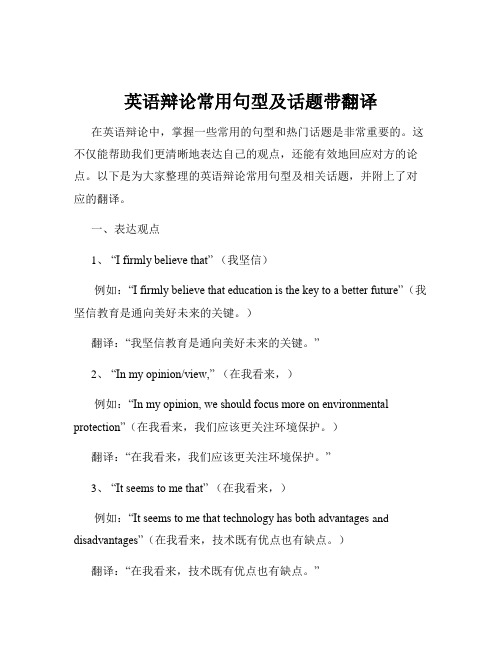
英语辩论常用句型及话题带翻译在英语辩论中,掌握一些常用的句型和热门话题是非常重要的。
这不仅能帮助我们更清晰地表达自己的观点,还能有效地回应对方的论点。
以下是为大家整理的英语辩论常用句型及相关话题,并附上了对应的翻译。
一、表达观点1、“I firmly believe that” (我坚信)例如:“I firmly believe that education is the key to a better future”(我坚信教育是通向美好未来的关键。
)翻译:“我坚信教育是通向美好未来的关键。
”2、“In my opinion/view,” (在我看来,)例如:“In my opinion, we should focus more on environmental protection”(在我看来,我们应该更关注环境保护。
)翻译:“在我看来,我们应该更关注环境保护。
”3、“It seems to me that” (在我看来,)例如:“It seems to me that technology has both advantages and disadvantages”(在我看来,技术既有优点也有缺点。
)翻译:“在我看来,技术既有优点也有缺点。
”4、“I’m of the opinion that” (我的观点是)例如:“I’m of the opinion that we need to balance work and life”(我的观点是我们需要平衡工作和生活。
)翻译:“我的观点是我们需要平衡工作和生活。
”二、提出论据1、“First of all, Secondly, Finally,” (首先,其次,最后,)例如:“First of all, we have limited resources Secondly, the demand is increasing rapidly Finally, we need to find new solutions”(首先,我们的资源有限。
中考基本句型翻译成英语

63.这个游泳池 这个游泳池(swimming pool)长50m,宽20m,深2.5m。 这个游泳池 长 宽 , 。 64.很抱歉让你在这儿等这么长时间பைடு நூலகம்keep sb. doing 很抱歉让你在这儿等这么长时间。 很抱歉让你在这儿等这么长时间 65.那个军官让士兵们在太阳下站一个小时。 那个军官让士兵们在太阳下站一个小时。 那个军官让士兵们在太阳下站一个小时 66.在图书馆请保持安静。keep/make sth. +adj. 在图书馆请保持安静。 在图书馆请保持安静 67.这条消息使他们很难过 这条消息使他们很难过 68. 我喜欢听轻音乐。like to do / like doing 我喜欢听轻音乐。 69.别着急,让我替你照看林涛。make / let sb.(not) do sth. 别着急, 别着急 让我替你照看林涛。 70.他们让我们在雨中踢足球。 他们让我们在雨中踢足球。 他们让我们在雨中踢足球 71Neither bad weather nor the poor condition could change her mind to teach here. 72.Jim和Tom都不打算开车去买菜。 都不打算开车去买菜。 和 都不打算开车去买菜 73.我父母和姐姐中午都不在家吃饭。 我父母和姐姐中午都不在家吃饭。 我父母和姐姐中午都不在家吃饭 Neither my parents nor my sister has dinner at home. 74. 他们昨天赢了 他们昨天赢了(beat)申花队,我一点也不觉得惊讶。 not…at 申花队, 申花队 我一点也不觉得惊讶。 all 75.他对从事的工作一点也不感兴趣。 他对从事的工作一点也不感兴趣。 他对从事的工作一点也不感兴趣 76.If parents are not strict with their children at all, their marks will come down quickly.
初中英语基本句型翻译(45个)
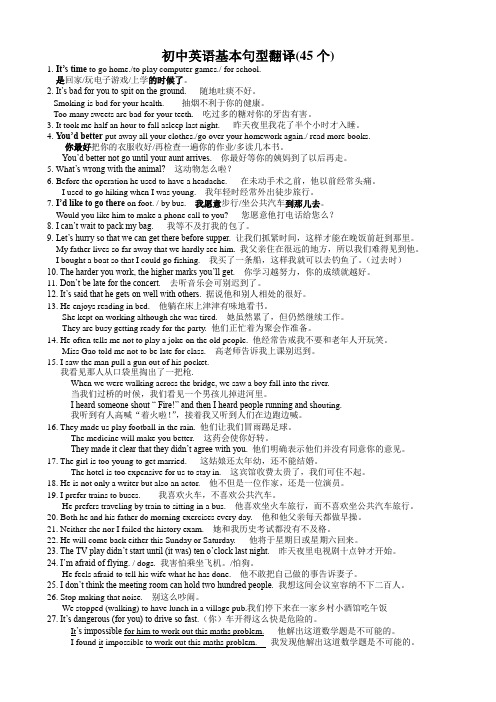
初中英语基本句型翻译(45个)1. It’s time to go home./to play computer games./ for school.是回家/玩电子游戏/上学的时候了。
2. It’s bad for you to spit on the ground. 随地吐痰不好。
Smoking is bad for your health. 抽烟不利于你的健康。
Too many sweets are bad for your teeth. 吃过多的糖对你的牙齿有害。
3. It took me half an hour to fall asleep last night. 昨天夜里我花了半个小时才入睡。
4. Y ou’d better put away all your clothes./go over your homework again./ read more books.你最好把你的衣服收好/再检查一遍你的作业/多读几本书。
Y ou’d better not go until your aunt arrives. 你最好等你的姨妈到了以后再走。
5. Wh at’s wrong with the animal?这动物怎么啦?6. Before the operation he used to have a headache. 在未动手术之前,他以前经常头痛。
I used to go hiking when I was young. 我年轻时经常外出徒步旅行。
7. I’d like to go there on foot. / by bus. 我愿意步行/坐公共汽车到那儿去。
Would you like him to make a phone call to you? 您愿意他打电话给您么?8. I can’t wait to pack my bag. 我等不及打我的包了。
9. Let’s hurry so that we can get there before supper.让我们抓紧时间,这样才能在晚饭前赶到那里。
英译汉中常见重要短语典型句型
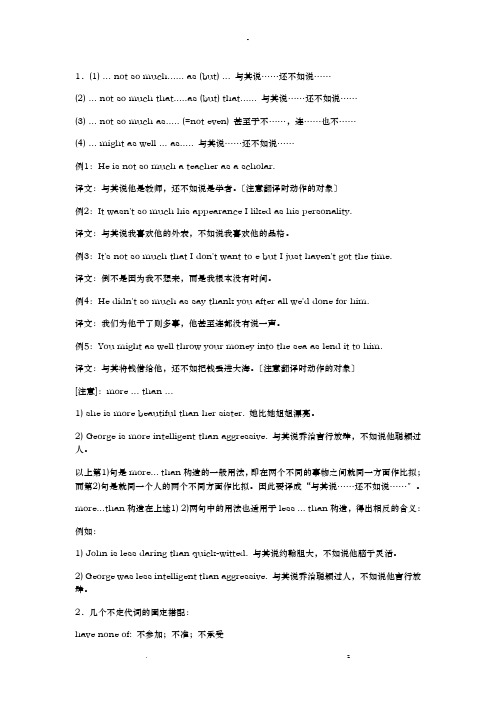
1.(1) ... not so much...... as (but) ... 与其说……还不如说……(2) ... not so much that.....as (but) that...... 与其说……还不如说……(3) ... not so much as..... (=not even) 甚至于不……,连……也不……(4) ... might as well ... as..... 与其说……还不如说……例1:He is not so much a teacher as a scholar.译文:与其说他是教师,还不如说是学者。
〔注意翻译时动作的对象〕例2:It wasn't so much his appearance I liked as his personality.译文:与其说我喜欢他的外表,不如说我喜欢他的品格。
例3:It's not so much that I don't want to e but I just haven't got the time.译文:倒不是因为我不想来,而是我根本没有时间。
例4:He didn't so much as say thank you after all we'd done for him.译文:我们为他干了则多事,他甚至连都没有说一声。
例5:You might as well throw your money into the sea as lend it to him.译文:与其将钱借给他,还不如把钱丢进大海。
〔注意翻译时动作的对象〕[注意]:more ... than ...1) she is more beautiful than her sister. 她比她姐姐漂亮。
2) George is more intelligent than aggressive. 与其说乔治言行放肆,不如说他聪颖过人。
初中英语作文万能句型100句带翻译
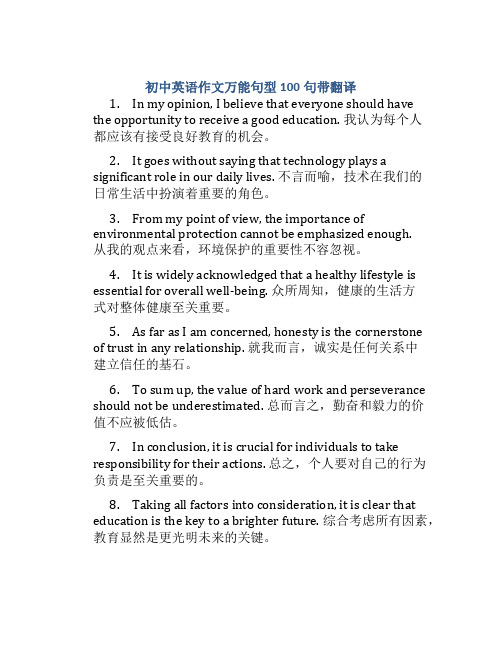
初中英语作文万能句型100句带翻译1.In my opinion, I believe that everyone should have the opportunity to receive a good education. 我认为每个人都应该有接受良好教育的机会。
2.It goes without saying that technology plays a significant role in our daily lives. 不言而喻,技术在我们的日常生活中扮演着重要的角色。
3.From my point of view, the importance of environmental protection cannot be emphasized enough.从我的观点来看,环境保护的重要性不容忽视。
4.It is widely acknowledged that a healthy lifestyle is essential for overall well-being. 众所周知,健康的生活方式对整体健康至关重要。
5.As far as I am concerned, honesty is the cornerstone of trust in any relationship. 就我而言,诚实是任何关系中建立信任的基石。
6.To sum up, the value of hard work and perseverance should not be underestimated. 总而言之,勤奋和毅力的价值不应被低估。
7.In conclusion, it is crucial for individuals to take responsibility for their actions. 总之,个人要对自己的行为负责是至关重要的。
8.Taking all factors into consideration, it is clear that education is the key to a brighter future. 综合考虑所有因素,教育显然是更光明未来的关键。
英语基本句型翻译

14.我从来没看见这个字这样用过。 15.他感到很难跟你交谈。 16.我认பைடு நூலகம்有可能用另一种方法解题。 17.学校定了一条规则,开始上课时学生要起立。 18.我认为与那个人谈话是无益的。
14.I have never seen the word used that way before. 15.He felt it very difficult to talk with you. 16. I consider it possible to work out the problem in another way. 17.The school made it a rule that the students should stand up when class begins. 18.I thought it no use talking with that man.
Beijing broke out the May 4 th Movement in 1919.
×
6.This box weighs five kilos.
7.秋天有些鸟飞到南方去。 8.我的爷爷早晨起得很早。 9.每天下午有许多学生到图书馆来借书。
7.In autumn, some birds fly to the south. 8.My grandfather gets up early in the morning. 9.Every afternoon a lot of students come to the library to borrow books.
There are many students that / who come to the library to borrow books. There are many students coming to the library to borrow books. A number of students go to the library to borrow books.
英语十四个句型
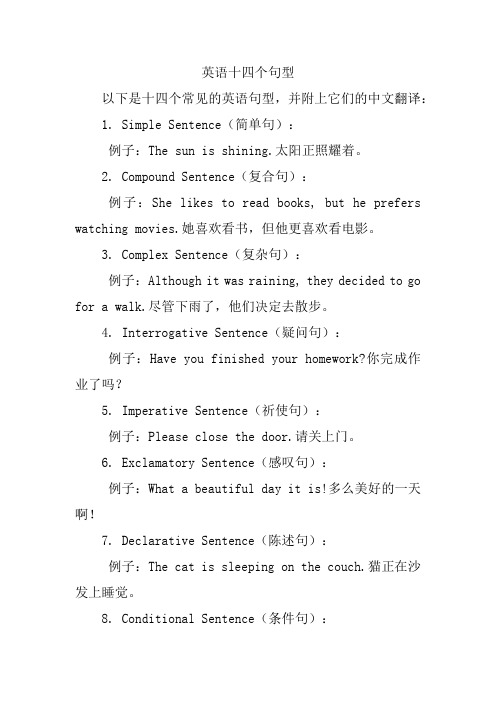
英语十四个句型以下是十四个常见的英语句型,并附上它们的中文翻译:1. Simple Sentence(简单句):例子:The sun is shining.太阳正照耀着。
2. Compound Sentence(复合句):例子:She likes to read books, but he prefers watching movies.她喜欢看书,但他更喜欢看电影。
3. Complex Sentence(复杂句):例子:Although it was raining, they decided to go for a walk.尽管下雨了,他们决定去散步。
4. Interrogative Sentence(疑问句):例子:Have you finished your homework?你完成作业了吗?5. Imperative Sentence(祈使句):例子:Please close the door.请关上门。
6. Exclamatory Sentence(感叹句):例子:What a beautiful day it is!多么美好的一天啊!7. Declarative Sentence(陈述句):例子:The cat is sleeping on the couch.猫正在沙发上睡觉。
8. Conditional Sentence(条件句):例子:If it rains, we will stay indoors.如果下雨,我们会呆在室内。
9. Passive Voice Sentence(被动语态句):例子:The cake was baked by Mary.蛋糕是玛丽烤的。
10. Direct Speech Sentence(直接引语句):例子:She said, "I will be there at 5 o'clock."她说:“我会在5点钟到那里。
- 1、下载文档前请自行甄别文档内容的完整性,平台不提供额外的编辑、内容补充、找答案等附加服务。
- 2、"仅部分预览"的文档,不可在线预览部分如存在完整性等问题,可反馈申请退款(可完整预览的文档不适用该条件!)。
- 3、如文档侵犯您的权益,请联系客服反馈,我们会尽快为您处理(人工客服工作时间:9:00-18:30)。
常见句型的翻译:定语从句的翻译状语从句的翻译名词性从句的翻译长句子的翻译定语从句的译法:Attributive clauses are widely used in English. In many cases, sentences are made very long because of attributive clauses. Hence it is important to have a correct comprehension and an accurate translation of attribute clauses. Different attributive clauses may express different meaning such as purpose, concession, result and so on. An attributive clause usually follows the word it modifies. This is different from Chinese. In Chinese there is no post-posi tion attributive and there can’t be too many modifiers preceding the modified word. All this causes changes in translating some sentences which contain attributive clauses.I、译成前置定语一般说来,限制性的定语从句可提前译成定语。
还有一些定语从句,虽然并不明显地带有限制性质,但本身较短,和被修饰语的关系紧密,也可译成前置定语。
1. To be sure, a great rebuilding project would give jobs to many of those people who need them.诚然,一个宏伟的重建计划也许能为许多需要工作的人提供就业机会。
2. This is the solider who just returned from the front.这是刚从前线回来的战士。
3. 成都一个你来了就不想离开的城市。
Chengdu—A city you will never want to say goodbye after arrival.4. In recent years, however, people have begun to become aware that cities are also areas where there is a concentration of problems.可是,近几年来人们开始意识到城市也是问题成堆的地方。
当然,有些起附加说明作用的非限制性定语从句,对先行词也有不同程度的修饰限制作用,有时也可以译为前置定语。
5. The sun, which had hidden all day, now came out in all its splendor.那个整天躲在云层里的太阳,现在又光芒四射地露面了。
6. He liked his sister, who was warm and pleasant, but he did not like his brother, who was aloof and arrogant.他喜欢热情愉快的妹妹,而不喜欢冷漠高傲的哥哥。
II . 译成后置定语A、一些结构比较复杂,或者意思上有较强的独立性的限制性定语从句,通常可译为后置的并列句。
采取这种译法往往要重复关系代词所代替的词,比如:有时可在此词之前加指示词“这”、“这些”或人称代词“他”、“他们”等等,来使译文明确。
7. This volume is prepared as examples for writing compositions which, as it were, has been taken as a difficult task.本书旨在为写作提供范例,可以说写作是一个难题。
8. Matter is composed of molecules that are composed of atoms.物质是由分子组成的,而分子又是由原子组成的。
9. But listen, I met a man, who said you could solve this problem.听着,我遇见一个人,这个人说你是有权解决这个问题的。
10. Day light comes from the sun, which is a mass of hot, glowing gas.日光来自太阳,太阳是一团炽热、发光的气体。
B、非限制性定语从句与先行词的关系不十分密切,只是对先行词加以说明,描述或解释,或对整个句子所陈述的事实或现象加以总结、补充说明,其前都有逗号分开。
在汉译时一般译为后置并列分句。
如:11.He blamed me for everything, which I thought very unfair.他把一切错误都归罪于我,我认为这很不公平。
12. These books, which are only a small part of my collection, I picked up in American.这些书是我在美国买,它们在我的藏书中只占一小部分。
13. She was very patient towards the children, which her husband seldom was.她对孩子们很耐心,而她丈夫却很少这样。
14. They seem to enjoy those rewards which they had purchased by a course of unmerited fatigue, and by victories which almost exceeded belief.他们对那些酬劳看来是很得意的,那些酬劳是他们历经千辛万苦,通过取得令人难以置信的胜利得来的。
15. I told the story to John, who(=and he) told it to his brother.我把这件事告诉了约翰,约翰又告诉了他的弟弟。
这种采取后置的办法来处理非限制性定语从句,一般也使用指示代词来重复英语关系代词所代表的含义。
III、溶合译法溶合法就是把原句子中的主语和定语从句溶合在一起译成一个独立句子的翻译方法。
另外,由于限制性定语从句与主句的关系密切,所以,限制性定语从句似乎更适合采用溶合法。
英语中突出的“there be” 句型就是这样处理的。
16. There are many people who want to select this major.许多人要选这个专业。
17. There is a man downstairs who wants to see you.楼下有人要见你。
18.You are the only person who could do it.只有你才能做这件事。
19. He has a son of twenty who is now at the college.他有个二十岁的儿子现在正上大学。
20. This was the first time I had serious trouble with my leader.这是我第一次和领导发生严重纠葛。
IV. 译成状语有些定语从句从形式上看是定语,但在意义上与主句有逻辑状语关系,对主句其原因、结果、目的、条件、让步等状语作用,翻译时应尽可能按照其语法功能,译成与汉语相对应的复句。
21. The computer, which seems to play the role of a human brain, is often called an electronic brain.由于计算机起着类似人脑的作用,所以常常被称作电脑。
(译成原因状从)22. She insisted on buying another pair of roller skates, which she had no use of.23. Rose took Chinese medicine which relieved her symptoms.罗斯服了中药,结果缓解了症状。
(译成结果状从)24. There is no bad habit that may not be cured by a strong willpower.只要有坚强的意志,就没有什么坏习惯改不掉。
(译成条件状从)25. The newswoman wishes to write an article that will attract public attention to shipwreck.这位女记者想写篇文章,以便能够引起公众对那起沉船事件的注意。
(译成目的状语从句)1. A rocket engine can work in space where there is no air.2.She has invited me to visit her family, which is very kind of her .3.He would be a short-sighted man who did not look beyond.4.There is something original, independent and heroic about the plan that pleased all of them.5.Here is the man whom you have been looking for.6.Our two countries are neighbors whose friendship is of long standing.状语从句的翻译I. 按照原文顺序译出状语从句1. If you do not mind, I will turn off the heating.如果你不介意,我就把暖气关上了。
2. As far as I know, there isn’t such a word in English.据我所知,英语里并没有这个单词。
3. Where water resources are plentiful, hydroelectric power stations are being built in large numbers. 哪里有充足的水源,哪里就在兴建大批的水电站。
